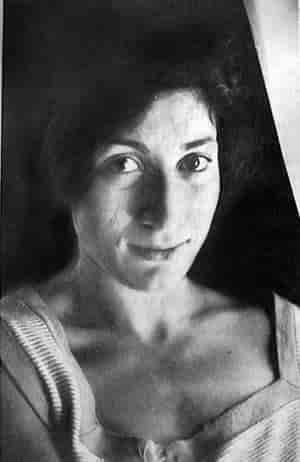I remember clearly the moment I met her. It was between the lines of a novel by Azar Nafisi. There she was, translated into French, just a tiny quote from her poems. And there I was, struck by her words, struck by the piece of her soul that was revealed to me.
I will never forget her, I will never forget her words. This small piece of herself which had been put on paper made me long to know more about her. I wanted to read more from this mysterious Iranian poet I had never heard of before. My sad aching heart needed her poetry.
Forough, Forough, her name was sung in each of my memories.
I searched for her in every bookshop, in every library of my parisian suburb.
She kept disappearing, slipping through my fingers.
She was not the kind of poet, one displayed broadly in French libraries and bookshops. She was the kind of poet society had tried to silence, she was the kind of poet one discovers with excitement and fear.
After a while, as I was beginning to lose hope, I discovered this Persian bookshop in the XVth arrondissement ; librairie Perse en Poche, le monde persan et l’Iran. After searching for her shadow on every bookshelf, I finally found her. At last. I bought an anthology with all her poems translated into French.
Although the translation lost some of its magic, I relished every word.
There was something comforting in her lines, something real.
Maybe it was her pain, her hope, her desire to live intensely, to love entirely.
She wrote about love, about cheating, about despair, about depression, about hope.
She wrote about being a woman in a world where women were treated as flowers under a glass bell.
Her poems were groundbreaking, her persona was too.
She was born in Teheran in 1934 and died in a car accident at the age of thirty-two in 1967. She was married at the age of sixteen to a man older than her, but soon divorced him after her affair was exposed. She lost custody over her son and was publicly criticised and set apart because of her daring poems (especially after publishing the poem “Sin” relating her affair with another man). All her life, she struggled with depression and was forced into a mental institution after a suicide attempt. She slowly got better while travelling through Europe and had a relationship with the married filmmaker Ebrahim Golestan who advised her to start filmmaking.
What is striking in Forough Farrokhzad’s poetry is her utter desire to live and to love fully. She reversed the usual codes of erotic peotry by making men the subject of her desire and fully embracing her sexuality. The reason why Forough Farrokhzad is called the Persian Sylvia Plath is because she openly writes about her sorrows, struggles and inner soul. That is why her works were banned after the Islamic revolution in Iran; a woman who thinks, a woman who feels is dangerous.
Even today, if my English teacher did not show in class the cover of Reading Lolita in Tehran by Azar Nafisi, I would not have rushed to the library,desperately trying to find the book. I would probably never have heard about the amazing Forough Farrokhzad. Maybe it is part of Forough Farrokhzad’s charm. Although her works are not much published in the West, that should not stop us from discovering her poetry.
Forough Farrokhzad screamed.
She never tried to fit into society’s conventions. She never gave up her art for someone.
In fact, maybe it is her art which saved her. Maybe from herself, maybe from society,maybe from being forgotten I’ll never know.
Maybe it is the first thing that I learned from her: to never give up writing. To never judge your art through how others perceive it. To never be ashamed of writing about your emotions, about your sexuality or about struggling with your mental health.
She taught me to never be afraid of living a bold life.
She taught me to try.
In 1954, when she was nineteen she went uninvited to one of the most prominent literary magazines “Roshanfekr” (The Intellectual) with three poems in her hands. One of them, Sin, brought her at the same time fame and social downfall.
And lastly, on a more personal note, I would add that she taught me how to love. To not try to fit into a box, to always trust your gut feeling, to be passionate and unapologetic.
Some may judge her personal life and frown upon her actions, but I admire her, because she was utterly real, and in a way utterly imperfect. Through her poetry she did not try to conceal her mistakes or her imperfections, but on the contrary she sublimated them. This can be explained by how Symbolism inspired her. Reading Forough’s poetry, I was reminded of this line by Baudelaire “tu m’as donné ta boue et j’en ai fait de l’or” in his poem Projet d’un épilogue pour l’édition de 1861 des Fleurs du mal. And it fits her poetic world perfectly. She took the “dirt” that society threw at her and transformed it into golden poems which remain forever engraved in history.
As a conclusion, I would write that Forough Farrokhzad taught me how to live an imperfect life through art. It is true that we cannot change the imperfect sides of our lives, but we can try to turn them into “gold” thanks to poetry.
Image Credit : Den Store Dankse via Creative Commons



